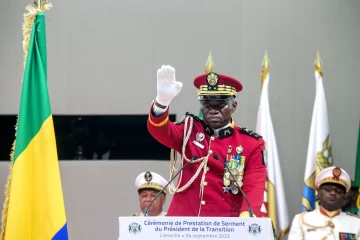Muammar Gaddafi’s fall, perhaps the Arab Spring’s biggest political casualty six years ago, heralded a moment of both hope and uncertainty for the country he had dominated for more than forty years.
In a manner few could have predicted, the stable state the late Libyan strongman once ruled is now a formidable contender for the worst political and security nightmare in the Mediterranean region.
Cut-throat rivalries for state capture by domestic political adversaries and a spirited onslaught for territorial hegemony by the Islamic State of Iraq and the Levant (ISIL) in recent years have been overshadowed by the edgy political rehabilitation in neighbouring former Arab Spring theatres. There is also the Syrian Armageddon which rages on, ensuring a tepid global response to the Libyan catastrophe and the steady drift of the North African country down the road of state decay and collapse.
“Oil production has collapsed, terrorist activity has risen alarmingly and our economy is in great peril. Youth unemployment stands at unacceptable levels. The scale of the challenges facing us is monumental”, Faiez Serraj, Prime Minister of the UN-backed Government of National Accord (GNA) in Libya, gloomily reflected in an op-ed in the Telegraph ahead of an international summit on Libya in Vienna last year.

The pressing question currently is: what is the viable blueprint for rescuing Libya from this regrettable quagmire? Libyan political insiders, Middle-East analysts and regional observers apparently couldn’t be posed a more polarising question. Lifting Western arms embargoes on Libya and releasing the oil-rich country’s frozen foreign assets could enhance prospects of bringing together rival governments and uniting local militias into a national army under Libyan civilian command, to eliminate ISIL and restore national security, Mr Serraj suggests.
Others like Middle East analyst Frederic Wehrey, a senior fellow affiliated with the Middle East Program of the Washington DC-based Carnegie Endowment for International Peace, caution that this idea has little hopes of accomplishing that goal due to the behind-the-scenes support of some of the rival Libyan governments and militias by powerful power-brokers in the Gulf region and beyond. He argues it only promises to escalate threats of intensified local conflicts and raise the potential of a civil war, leaving ISIL to exploit power vacuums to expand its footprints and deepen its penetration in Libya.
Should foreign support for combatting ISIL in Libya only follow the unification of Libya’s antagonistic governments and rival militia into a single national government and national civilian-controlled army respectively, or vice versa? How should either option be pursued? How should the African regional bloc, the African Union (AU), respond to the Libyan conundrum and mitigate threats of ISIL terrorism across the North African sub-region and other parts of the continent?
The answers to these questions may offer clues to unravelling the prevailing Libyan puzzle.


